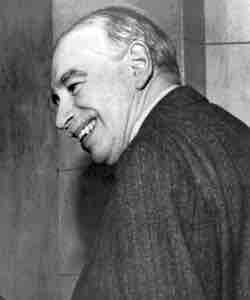Keynesian Theory
In economics, the Keynesian theory was first introduced by British economist John Maynard Keynes in his book The General Theory of Employment, Interest, and Money which was published in 1936 during the Great Depression . Keynesian economics states that in the short-run, especially during recessions, economic output is substantially influenced by aggregate demand (the total spending in the economy). According to the Keynesian theory, aggregate demand does not necessarily equal the productive capacity of the economy. Keynesian theorists believe that aggregate demand is influenced by a series of factors and responds unexpectedly. The shift in aggregate demand impacts production, employment, and inflation in the economy.

John Maynard Keynes
John Maynard Keynes introduced Keynesian theory in his book, The General Theory of Employment, Interest, and Money.
Economic Thought
At the time that Keynesian theory was developed, mainstream economic thought believed that the economy existed in a state of general equilibrium. The belief was that the economy naturally consumes whatever it produces because the act of producing creates enough income in the economy for that consumption to take place.
Keynesian theory has certain characteristic beliefs:
- Unemployment is the result of structural inadequacies within the economic system. It is not a product of laziness as believed previously.
- During a recession, the economy may not return naturally to full employment. The government must step in and utilize government spending to stimulate economic growth. A lack of investment in goods and services causes the economy to operate below its potential output and growth rate.
- An active stabilization policy is needed to reduce the amplitude of the business cycle. Keynesian economists believed that aggregate demand for goods and services not meeting the supply was one of the most serious economic problems.
- Excessive saving, saving beyond investment, is a serious problem that encouraged recession and even depression.
- Cutting wages will not cure a recession.
- Overcoming an economic depression requires economic stimulus, which could be achieved by cutting interest rates and increasing the level of government investment.
Schools of Economic Thought
It is important to understand the stances of the various school of economic thought. Although the beliefs of each school vary, all of the schools of economic thought have contributed to economic theory is some way.
The Keynesian School of economic thought emphasized the need for government intervention in order to stabilize and stimulate the economy during a recession or depression. In contrast, the Chicago School of economic thought focused price theory, rational expectations, and free market policies with little government intervention. The Austrian School of economic thought focused on the belief that all economic phenomena are caused by the subjective choices of individuals. Unlike other schools, the Austrian school focused on individual actions instead of society as a whole.